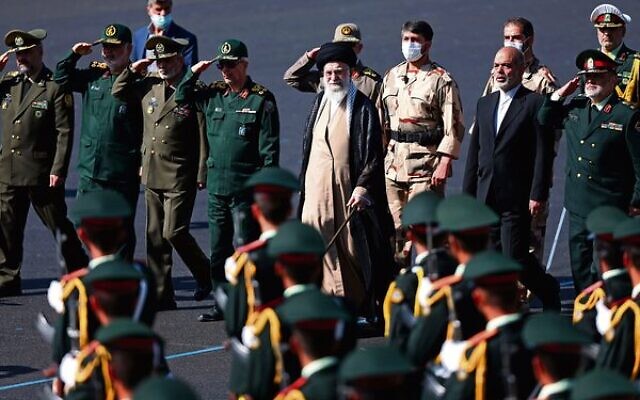Iran leader blames Israel, US for protests
Iran's supreme leader Ayatollah Ali Khamenei has condemned the biggest protests in Iran in years as a foreign plot to destabilise the country.

Iran’s supreme leader Ayatollah Ali Khamenei responded publicly on Monday to the biggest protests in Iran in years, breaking weeks of silence to condemn what he called “rioting”, and accuse the US and Israel of planning the protests.
Khamenei said he was “heartbroken” by the death of 22-year-old Mahsa Amini in the custody of Iran’s morality police, which set off the nationwide protests, calling her death a “sad incident”. However, he sharply condemned the protests as a foreign plot to destabilise Iran, echoing authorities’ previous comments.
“This rioting was planned,” he told a cadre of police students in Tehran. “These riots and insecurities were designed by America and the Zionist regime, and their employees.”
He described scenes of protesters ripping off their state-mandated headscarves and setting fire to mosques, banks and police cars as “not normal” and “unnatural”.
His comments come as nationwide protests sparked by Amini’s death entered the third week despite the government’s efforts to crack down.
Iran’s state TV has reported the death toll from violent clashes between protesters and security officers could be as high as 41, without providing details. However, human rights groups say the death toll is at least 92.
An untold number of people have been apprehended, with local officials reporting at least 1500 arrests.
Authorities have repeatedly blamed foreign countries and exiled opposition groups for fanning the unrest, without providing evidence.
The protests over Amini’s death have tapped into a deep well of grievances in Iran, including the country’s surging prices, high unemployment, social restrictions and political repression. Demonstrations have continued in Tehran and far-flung provinces, even as authorities have restricted internet access to the outside world and blocked social media apps.
As the new academic year began this week, students gathered in protest at universities across Iran, according to videos widely shared on social media, chanting slogans against the government and denouncing security forces’ clampdown on demonstrators.
Universities in major cities including Isfahan in central Iran, Mashhad in the north-east and Kermanshah in the west have held protests featuring crowds of students clapping, chanting and burning state-mandated headscarves.
“Don’t call it a protest, it’s a revolution now,” shouted students at Shahid Beheshti University in the capital of Tehran, as women took off their hijabs and set them alight, in protest over Iran’s law requiring women to cover their hair.
“Students are awake, they hate the leadership!” chanted crowds of students at the University of Mazandaran in the country’s north.
TIMES OF ISRAEL, AP

comments